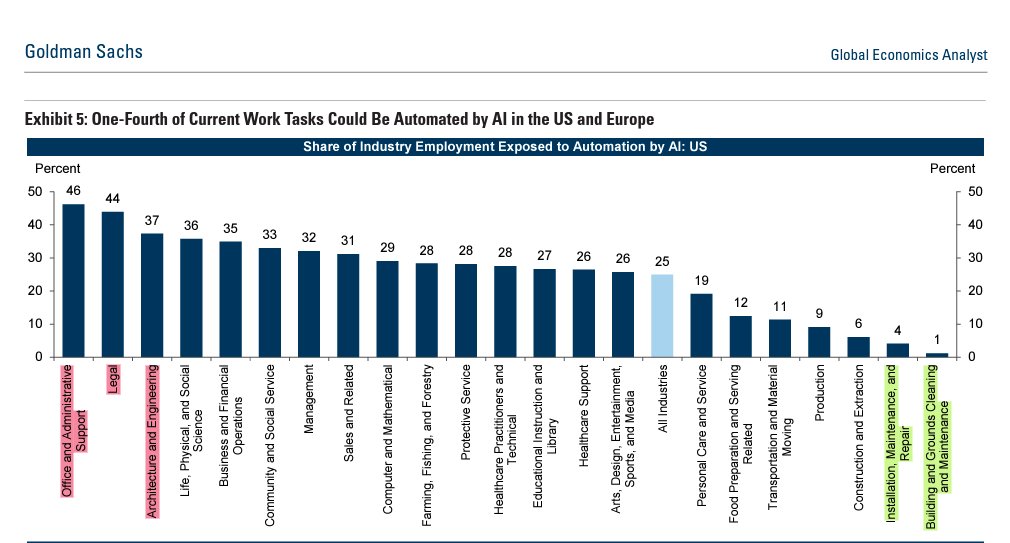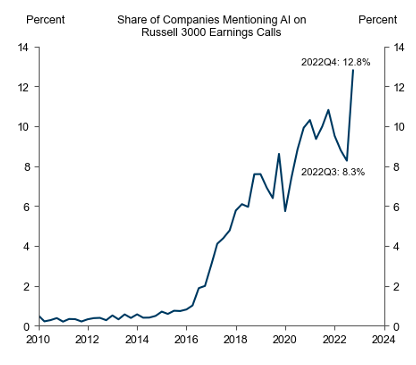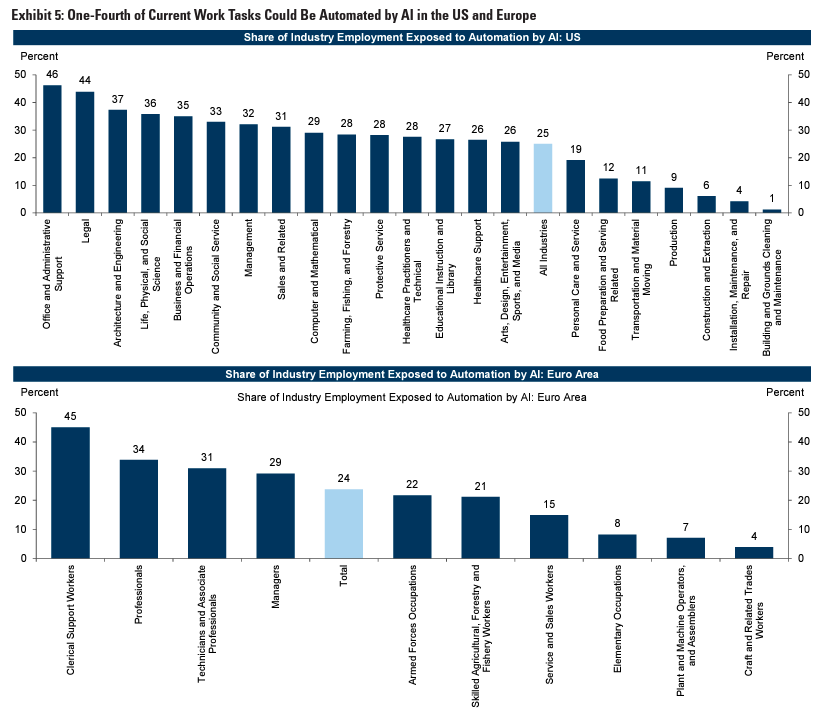Thread by Alex Banks
- Tweet
- Apr 4, 2023
- #ArtificialIntelligence #Business
Thread
Goldman Sachs just released their AI report on economic growth.
They predict 300 million jobs will be lost to automation.
Here are the key takeaways everyone must know:
They predict 300 million jobs will be lost to automation.
Here are the key takeaways everyone must know:
1/ Labour market disruption
Generative AI has huge macroeconomic effects:
• 2/3 of current jobs are exposed to some AI automation
• 1/4 of current work could be substituted by generative AI
• 300 million jobs will be automated from extrapolating estimates
Generative AI has huge macroeconomic effects:
• 2/3 of current jobs are exposed to some AI automation
• 1/4 of current work could be substituted by generative AI
• 300 million jobs will be automated from extrapolating estimates
2/ Productivity boom
Worker displacement from automation has historically been offset by:
• New job creation
• Significant labour cost savings
• Higher productivity for non-displaced workers
AI could raise annual US labour productivity growth by 1.5% over a 10-year period.
Worker displacement from automation has historically been offset by:
• New job creation
• Significant labour cost savings
• Higher productivity for non-displaced workers
AI could raise annual US labour productivity growth by 1.5% over a 10-year period.
3/ Investment in AI
Management teams of publicly-traded companies increasingly cite AI in earnings calls.
These indications of interest predict large increases in company capital investment.
In 2021 global private investment in AI totalled $94 billion—5x from 5 years prior.
Management teams of publicly-traded companies increasingly cite AI in earnings calls.
These indications of interest predict large increases in company capital investment.
In 2021 global private investment in AI totalled $94 billion—5x from 5 years prior.
4/ Job automation
2/3 of US occupations are exposed to automation.
1/4 of current tasks could be automated by AI in the US.
High exposure to white-collar jobs:
• Administrative (46%)
• Legal (44%)
Low exposure to blue-collar jobs:
• Construction (6%)
• Maintenance (4%)
2/3 of US occupations are exposed to automation.
1/4 of current tasks could be automated by AI in the US.
High exposure to white-collar jobs:
• Administrative (46%)
• Legal (44%)
Low exposure to blue-collar jobs:
• Construction (6%)
• Maintenance (4%)
5/ Substituting vs complementing the future of work
Most jobs are only partially exposed to automation.
Therefore they are more likely to be complemented rather than substituted by AI.
For current US employment:
• 7% → substituted
• 63% → complemented
• 30% → unaffected
Most jobs are only partially exposed to automation.
Therefore they are more likely to be complemented rather than substituted by AI.
For current US employment:
• 7% → substituted
• 63% → complemented
• 30% → unaffected
6/ Productivity boost
AI-driven automation can raise global GDP through:
1. Freed-up capacity
Most workers are only partially exposed to AI automation.
Following AI adoption their freed-up capacity can be allocated to productive activities that boost their output by 2-3%/year
AI-driven automation can raise global GDP through:
1. Freed-up capacity
Most workers are only partially exposed to AI automation.
Following AI adoption their freed-up capacity can be allocated to productive activities that boost their output by 2-3%/year
2. Re-employment
Workers that are displaced by AI will eventually be re-employed.
This will boost total output in new occupations from AI adoption.
For example innovations in tech introduced new occupations like webpage designers, software developers and digital marketers.
Workers that are displaced by AI will eventually be re-employed.
This will boost total output in new occupations from AI adoption.
For example innovations in tech introduced new occupations like webpage designers, software developers and digital marketers.
I feel the total impact will depend on the adoption timeline—society is generally slow at taking up new technologies.
Widespread AI adoption could drive:
• 7% ($7tn) increase in annual global GDP over a 10-year period
• US investment in AI to approach 1% of US GDP by 2030
Widespread AI adoption could drive:
• 7% ($7tn) increase in annual global GDP over a 10-year period
• US investment in AI to approach 1% of US GDP by 2030
I personally can't wait to see the enormous impact generative AI has on the economy.
We are entering a golden age and I'm excited to build.
Follow me @thealexbanks for more on AI.
If you liked this thread, you'll love the newsletter.
Subscribe here:
noise.beehiiv.com/subscribe
We are entering a golden age and I'm excited to build.
Follow me @thealexbanks for more on AI.
If you liked this thread, you'll love the newsletter.
Subscribe here:
noise.beehiiv.com/subscribe
Help everyone learn and retweet this thread:
You can find the full report here:
www.key4biz.it/wp-content/uploads/2023/03/Global-Economics-Analyst_-The-Potentially-Large-Effects-of-...
www.key4biz.it/wp-content/uploads/2023/03/Global-Economics-Analyst_-The-Potentially-Large-Effects-of-...


